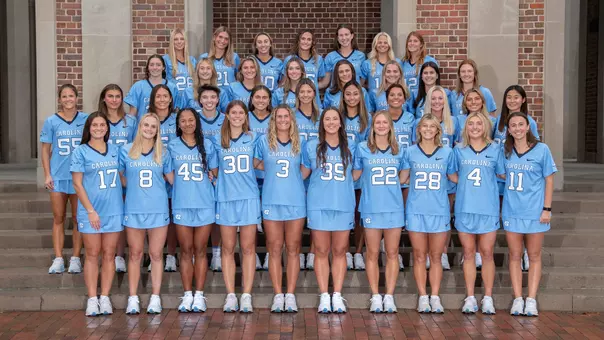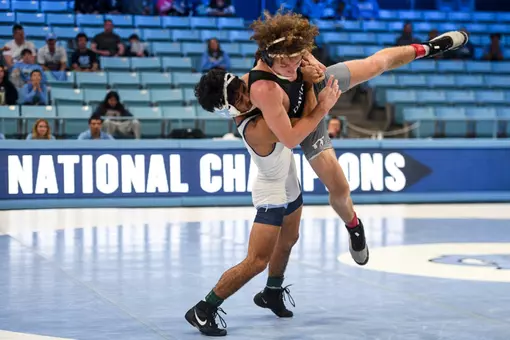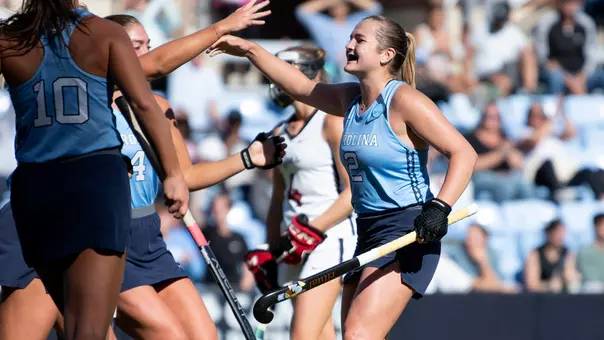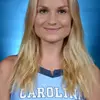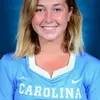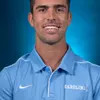University of North Carolina Athletics
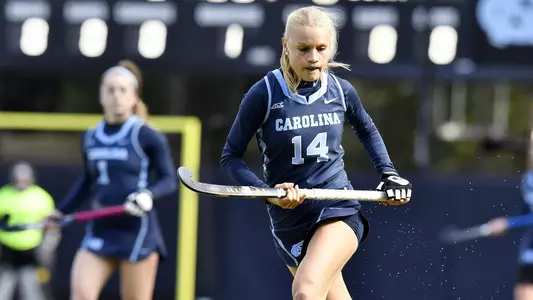
Photo by: Jeffrey A. Camarati
GoHeels Exclusive: A New Reality
March 29, 2020 | Baseball, Field Hockey, Women's Lacrosse, Wrestling, Featured Writers
By Pat James, GoHeels.com
As the number of coronavirus cases across Europe rose last month, surging in Italy, Spain and her native Germany, Feline Guenther watched from afar, aware of what was going on but unable to fully grasp the outbreak's severity.
A North Carolina field hockey senior in her last semester at UNC, Guenther regularly heard from her parents back in Hamburg about the dangers of the virus. The more it spread, the more concerned they became. And by early March, they started discussing the prospect of Guenther returning home. Guenther, however, didn't believe that was necessary.
Few Americans, she said, seemed concerned at the time about the virus. So, when Carolina's spring break began on March 6, she didn't hesitate to go with some of her friends on their pre-planned trip to Cancun, Mexico.
But upon returning to Chapel Hill nine days later, she found it – and her world as she knew it – in a completely different state.
"I just thought my parents were totally over-exaggerating," said Guenther, who has since returned to Germany, in an email this week. "When everything proceeded to get worse over spring break and I returned to a completely empty Chapel Hill (on March 15), it just felt like a very bad dream."
Two weeks later, it still does, not only for Guenther and her fellow Tar Heels, but for student-athletes across the country as they continue to adjust to this new reality, one without sports and in-person classes.
For Jamie Ortega, the first sign came on March 11, when the Ivy League announced it was canceling all its spring sports. At the time, she and her teammates on the top-ranked UNC women's lacrosse team were still optimistic their season would continue. But that sentiment shifted to anxiety and fear when Ortega woke up to a text the next morning that said the Patriot League had canceled its spring sports, as well.
An hour later, Ortega and her housemates left for their film session for No. 2 Notre Dame, which they were scheduled to play that Sunday in Chapel Hill. They were almost to Dorrance Field when they received a text from Jenny Levy: "No film today. Just meet at the field."
"And like, that was it," said Ortega, a junior. "We all just sat in our cars waiting, just waiting. And I know a lot of us cried. We were just really sad. My whole house was crying, my whole grade. Everyone's texting all their friends on other teams seeing what they'd heard.
"The not knowing and the waiting, I think that was like really brutal. When our coach sent us that message, we all lost it."
By the time Levy arrived, the ACC hadn't made a decision. So the Tar Heels still held their 11:30 a.m. practice. Instead of preparing for the Fighting Irish, though, they did all their favorite drills and even scrimmaged, knowing it could be their last time on the field together. Afterward, Ortega and a few others went to Maple View Farm Ice Cream, where they waited out the news.
Finally, around 3 p.m., an email came in from Bubba Cunningham, informing them that the ACC had suspended all athletic-related activities. That, Ortega could take, she said. But within an hour, Levy called a team meeting to announce the NCAA had canceled all remaining winter and spring championships.
"We stayed in our locker room for like an hour and a half, just all of us talking," Ortega said. "It was really sad. It really sucked. After the Northwestern game (on March 9), we were so happy; we had won and we had spring break. Then it all just hit within a few days."
Throughout that week, the Carolina wrestling team had been training for the NCAA Championships, scheduled for March 19-21 in Minneapolis. Seven Tar Heels were slated to compete in the event. And redshirt freshman Michael Goldfeder didn't expect that to change, not even after the NCAA closed the championships to the general public on March 12.
The next day, however, amid the flurry of reports about seasons being canceled, Goldfeder received a call from his father, telling him the championships would certainly be canceled, too. About an hour later, Coleman Scott stopped practice to announce the ACC's decision.
"I don't want to say you're training for nothing because ultimately you're training for the love of the sport," Goldfeder said. "But in a way, the whole year was really for nothing because NCAAs is the showcase – that's what you're peaking for. So for guys like that, the seven NCAA qualifiers, it's heartbreaking; there's really no other way to put it.
"It was very emotional for them – and for the whole team, too, because it was a team effort."
The news was just as startling for Dallas Tessar.
Days removed from being swept by Notre Dame, Tessar, a senior outfielder, felt as if the UNC baseball team was starting to turn a corner. The Tar Heels had just rebounded to win a pair of midweek games against Gardner-Webb and VMI. And that Thursday afternoon, he said they had their best practice of the season.
Immediately after that practice ended, though, Mike Fox pulled his players into the Boshamer Stadium players' lounge and broke the news from the ACC.
"Then everything started coming out," Tessar said. "The NCAA released that the (championships were) canceled within an hour and a bunch of news kind of just came out of nowhere. So we kinda just didn't really know what to do.
"Coach sent us a text, saying, 'I don't know what to say. I'm devastated. I'll provide you guys with any information that I receive in the next upcoming days.'"
So, they waited. And waited some more. And on March 17, the ACC canceled all athletic activities through the end of the 2019-20 academic year.
That same day, the University announced residence halls will be closed to all residents for the rest of the academic year, with few exceptions. Most student-athletes – such as Guenther, Ortega (from Centereach, N.Y.) and Goldfeder (from Sherman Oaks, Calif.) – returned home. But some – such as Tessar, who felt safer at his off-campus house than in Simi Valley, Calif. – stayed.
With spring break extended until last Monday, many searched for ways to fill the time as they practiced social distancing. Tessar said he and his housemates played a lot of board games, specifically Monopoly and Catan. Ortega bought a coloring book and immersed herself in reading. Like Guenther – whose activities have included FaceTiming her friends in the U.S. and starting an online course about financial modeling in Excel – she's also been walking her dog.
When he's not watching the news or hanging out with his family, Goldfeder has been working out in his home gym. Staying active has also been a priority for Guenther, Ortega and Tessar, but that hasn't been easy, with gyms and athletic facilities predominantly closed. (Stay tuned to GoHeels.com for a piece on the improvisation and flexibility required as UNC student-athletes continue working out.)
Another challenge came this past week with the start of online classes.
By this point in the school year, Goldfeder said most students have hit their stride academically, making the shift to Zoom – the videoconferencing application that the majority of Americans now seem to be using to communicate – that much harder. The support he's received from his professors, though, has been overwhelming.
"I cannot say a bad thing about any one of my professors in the way that they've been handling this," Goldfeder said. "Everyone understands no one at this university signed up for this. Everyone's understanding and there's a lot of leniency, which is good because it's confusing, because this first week I'm still trying to figure all this out."
One of Goldfeder's biggest obstacles has been adjusting to the time difference between California and North Carolina. Enrolled in a 9 a.m. ET class this semester, he's now waking up before 6 a.m. three times each week. But he's not complaining; he knows others have it worse.
Among them is Guenther.
As someone who describes herself as being very energetic and productive in the morning, Guenther said being in three classes that run from 2:30-5:15 and 9:30-10:55 p.m. Central European Standard Time, six hours ahead of Chapel Hill, has prevented her from establishing any semblance of a routine. It's especially hard for her to concentrate in her latest class, knowing she can declare it as pass/fail.
In terms of taking her classes online, Guenther, a business administration major, said she's never minded working individually and at her own pace. But she misses her classmates and professors.
"I always enjoyed going to class, doing group work, preparing presentations and listening to my classmates discussions," she said. "One of my favorite classes at Carolina was actually a Business Improvisation class, in which we learn to be spontaneous, act natural, and to be present in the moment. However, it's nearly impossible to teach an improv class online because it's based on personal interactions and connections."
Those, especially the ones he has with his teammates, are what Tessar misses most. Excluding the health and safety of everyone in the country, he said he's spent more time thinking about the time he's not getting to spend with them than he has about what this year's team could have accomplished – or even if his college career is over.
On Monday, the NCAA Division I Council is scheduled to vote on whether to allow another year of eligibility for spring sport athletes. The DI Board of Directors, comprised primarily of university presidents and chancellors, will then have the chance to weigh in on the matter.
If relief is approved – and he isn't selected in the MLB Draft – Tessar said he'd want to come back to UNC. But initially unsatisfied with how this season ended, he knows there are more important things to worry about right now than if he'll ever suit up for the Tar Heels again.
"When you see how this (pandemic) has unfolded, it goes way beyond just the seniors," Tessar said. "You think, 'What about the assistant coaches who haven't gotten paid?' They get their money from summer camps, summer tournaments on the field. … So, this is affecting people's livelihoods. And I would be upset about me possibly not getting my last year to play baseball? It's just a game, right? At some point, perspective-wise, this affects universities, this affects livelihoods. It goes way past just me and how I feel."
Ortega has realized that, as well.
"Overall, this happened because of the health and safety of our country and we kind of just have to think of that," she said. "That's just bigger than who we are. Obviously, I'm devastated for our season and for everyone else's seasons that were cut short. But if we can get through this pandemic, I think that's the biggest goal of everyone."
Until then, Guenther continues to watch from afar, more aware than ever of what's going on but unsure of when she'll be able to return to the U.S. and see her teammates, her friends, her coaches or any of the other people at UNC who she loves so much.
As the number of coronavirus cases across Europe rose last month, surging in Italy, Spain and her native Germany, Feline Guenther watched from afar, aware of what was going on but unable to fully grasp the outbreak's severity.
A North Carolina field hockey senior in her last semester at UNC, Guenther regularly heard from her parents back in Hamburg about the dangers of the virus. The more it spread, the more concerned they became. And by early March, they started discussing the prospect of Guenther returning home. Guenther, however, didn't believe that was necessary.
Few Americans, she said, seemed concerned at the time about the virus. So, when Carolina's spring break began on March 6, she didn't hesitate to go with some of her friends on their pre-planned trip to Cancun, Mexico.
But upon returning to Chapel Hill nine days later, she found it – and her world as she knew it – in a completely different state.
"I just thought my parents were totally over-exaggerating," said Guenther, who has since returned to Germany, in an email this week. "When everything proceeded to get worse over spring break and I returned to a completely empty Chapel Hill (on March 15), it just felt like a very bad dream."
Two weeks later, it still does, not only for Guenther and her fellow Tar Heels, but for student-athletes across the country as they continue to adjust to this new reality, one without sports and in-person classes.
For Jamie Ortega, the first sign came on March 11, when the Ivy League announced it was canceling all its spring sports. At the time, she and her teammates on the top-ranked UNC women's lacrosse team were still optimistic their season would continue. But that sentiment shifted to anxiety and fear when Ortega woke up to a text the next morning that said the Patriot League had canceled its spring sports, as well.
An hour later, Ortega and her housemates left for their film session for No. 2 Notre Dame, which they were scheduled to play that Sunday in Chapel Hill. They were almost to Dorrance Field when they received a text from Jenny Levy: "No film today. Just meet at the field."
"And like, that was it," said Ortega, a junior. "We all just sat in our cars waiting, just waiting. And I know a lot of us cried. We were just really sad. My whole house was crying, my whole grade. Everyone's texting all their friends on other teams seeing what they'd heard.
"The not knowing and the waiting, I think that was like really brutal. When our coach sent us that message, we all lost it."
By the time Levy arrived, the ACC hadn't made a decision. So the Tar Heels still held their 11:30 a.m. practice. Instead of preparing for the Fighting Irish, though, they did all their favorite drills and even scrimmaged, knowing it could be their last time on the field together. Afterward, Ortega and a few others went to Maple View Farm Ice Cream, where they waited out the news.
Finally, around 3 p.m., an email came in from Bubba Cunningham, informing them that the ACC had suspended all athletic-related activities. That, Ortega could take, she said. But within an hour, Levy called a team meeting to announce the NCAA had canceled all remaining winter and spring championships.
"We stayed in our locker room for like an hour and a half, just all of us talking," Ortega said. "It was really sad. It really sucked. After the Northwestern game (on March 9), we were so happy; we had won and we had spring break. Then it all just hit within a few days."
Throughout that week, the Carolina wrestling team had been training for the NCAA Championships, scheduled for March 19-21 in Minneapolis. Seven Tar Heels were slated to compete in the event. And redshirt freshman Michael Goldfeder didn't expect that to change, not even after the NCAA closed the championships to the general public on March 12.
The next day, however, amid the flurry of reports about seasons being canceled, Goldfeder received a call from his father, telling him the championships would certainly be canceled, too. About an hour later, Coleman Scott stopped practice to announce the ACC's decision.
"I don't want to say you're training for nothing because ultimately you're training for the love of the sport," Goldfeder said. "But in a way, the whole year was really for nothing because NCAAs is the showcase – that's what you're peaking for. So for guys like that, the seven NCAA qualifiers, it's heartbreaking; there's really no other way to put it.
"It was very emotional for them – and for the whole team, too, because it was a team effort."
The news was just as startling for Dallas Tessar.
Days removed from being swept by Notre Dame, Tessar, a senior outfielder, felt as if the UNC baseball team was starting to turn a corner. The Tar Heels had just rebounded to win a pair of midweek games against Gardner-Webb and VMI. And that Thursday afternoon, he said they had their best practice of the season.
Immediately after that practice ended, though, Mike Fox pulled his players into the Boshamer Stadium players' lounge and broke the news from the ACC.
"Then everything started coming out," Tessar said. "The NCAA released that the (championships were) canceled within an hour and a bunch of news kind of just came out of nowhere. So we kinda just didn't really know what to do.
"Coach sent us a text, saying, 'I don't know what to say. I'm devastated. I'll provide you guys with any information that I receive in the next upcoming days.'"
So, they waited. And waited some more. And on March 17, the ACC canceled all athletic activities through the end of the 2019-20 academic year.
That same day, the University announced residence halls will be closed to all residents for the rest of the academic year, with few exceptions. Most student-athletes – such as Guenther, Ortega (from Centereach, N.Y.) and Goldfeder (from Sherman Oaks, Calif.) – returned home. But some – such as Tessar, who felt safer at his off-campus house than in Simi Valley, Calif. – stayed.
With spring break extended until last Monday, many searched for ways to fill the time as they practiced social distancing. Tessar said he and his housemates played a lot of board games, specifically Monopoly and Catan. Ortega bought a coloring book and immersed herself in reading. Like Guenther – whose activities have included FaceTiming her friends in the U.S. and starting an online course about financial modeling in Excel – she's also been walking her dog.
When he's not watching the news or hanging out with his family, Goldfeder has been working out in his home gym. Staying active has also been a priority for Guenther, Ortega and Tessar, but that hasn't been easy, with gyms and athletic facilities predominantly closed. (Stay tuned to GoHeels.com for a piece on the improvisation and flexibility required as UNC student-athletes continue working out.)
Another challenge came this past week with the start of online classes.
By this point in the school year, Goldfeder said most students have hit their stride academically, making the shift to Zoom – the videoconferencing application that the majority of Americans now seem to be using to communicate – that much harder. The support he's received from his professors, though, has been overwhelming.
"I cannot say a bad thing about any one of my professors in the way that they've been handling this," Goldfeder said. "Everyone understands no one at this university signed up for this. Everyone's understanding and there's a lot of leniency, which is good because it's confusing, because this first week I'm still trying to figure all this out."
One of Goldfeder's biggest obstacles has been adjusting to the time difference between California and North Carolina. Enrolled in a 9 a.m. ET class this semester, he's now waking up before 6 a.m. three times each week. But he's not complaining; he knows others have it worse.
Among them is Guenther.
As someone who describes herself as being very energetic and productive in the morning, Guenther said being in three classes that run from 2:30-5:15 and 9:30-10:55 p.m. Central European Standard Time, six hours ahead of Chapel Hill, has prevented her from establishing any semblance of a routine. It's especially hard for her to concentrate in her latest class, knowing she can declare it as pass/fail.
In terms of taking her classes online, Guenther, a business administration major, said she's never minded working individually and at her own pace. But she misses her classmates and professors.
"I always enjoyed going to class, doing group work, preparing presentations and listening to my classmates discussions," she said. "One of my favorite classes at Carolina was actually a Business Improvisation class, in which we learn to be spontaneous, act natural, and to be present in the moment. However, it's nearly impossible to teach an improv class online because it's based on personal interactions and connections."
Those, especially the ones he has with his teammates, are what Tessar misses most. Excluding the health and safety of everyone in the country, he said he's spent more time thinking about the time he's not getting to spend with them than he has about what this year's team could have accomplished – or even if his college career is over.
On Monday, the NCAA Division I Council is scheduled to vote on whether to allow another year of eligibility for spring sport athletes. The DI Board of Directors, comprised primarily of university presidents and chancellors, will then have the chance to weigh in on the matter.
If relief is approved – and he isn't selected in the MLB Draft – Tessar said he'd want to come back to UNC. But initially unsatisfied with how this season ended, he knows there are more important things to worry about right now than if he'll ever suit up for the Tar Heels again.
"When you see how this (pandemic) has unfolded, it goes way beyond just the seniors," Tessar said. "You think, 'What about the assistant coaches who haven't gotten paid?' They get their money from summer camps, summer tournaments on the field. … So, this is affecting people's livelihoods. And I would be upset about me possibly not getting my last year to play baseball? It's just a game, right? At some point, perspective-wise, this affects universities, this affects livelihoods. It goes way past just me and how I feel."
Ortega has realized that, as well.
"Overall, this happened because of the health and safety of our country and we kind of just have to think of that," she said. "That's just bigger than who we are. Obviously, I'm devastated for our season and for everyone else's seasons that were cut short. But if we can get through this pandemic, I think that's the biggest goal of everyone."
Until then, Guenther continues to watch from afar, more aware than ever of what's going on but unsure of when she'll be able to return to the U.S. and see her teammates, her friends, her coaches or any of the other people at UNC who she loves so much.
Players Mentioned
WBB: Post-Louisville Press Conference - December 14, 2025
Monday, December 15
UNC Men's Basketball: Wilson, Powell Lead 80-62 Win Over USC Upstate
Saturday, December 13
UNC Wrestling: #22 Carolina Downs #17 West Virginia in Carmichael, 27-7
Saturday, December 13
Hubert Davis Post-Georgetown Press Conference
Monday, December 08


